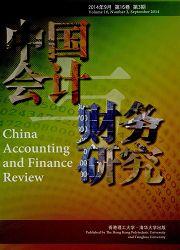Political uncertainty and cost stickiness: evidence from prefecture-city official turnover in China
引用次数: 3
Abstract
PurposeThe aim of this study is to investigate the impact of local political uncertainty on the asymmetric cost behavior (i.e. cost stickiness) for listed firms in China.Design/methodology/approachIn this study, the authors manually collect the turnover data of prefecture-city officials as a measure of exogenous fluctuations in political uncertainty and obtain firm-level financial information from the China Stock Market Accounting Research (CSMAR) database. To perform the analysis, the authors augment the traditional cost stickiness model by including the interaction terms of the prefecture-city official turnover, and firm-level and prefecture-city level control variables.FindingsThe authors find that political turnover leads to a higher degree of cost stickiness, implying that firms retain slack resources when political uncertainty is high. Moreover, the effect of political turnover on cost stickiness is more pronounced for firms residing in regions with weaker institutional environments, and firms that are privately owned and with smaller size. The authors further provide evidence that policy uncertainty and the threat of losing political connection are two underlying channels. Overall, this study documents that the local political process is an important channel that influences corporate operational decisions.Originality/valueThis study provides the first piece of evidence on the relation between political uncertainty and cost stickiness at the local government level. Moreover, the authors propose and demonstrate two underlying channels through which political uncertainty affects firms' asymmetric cost behavior.政治不确定性与成本粘性:来自中国地级市官员更替的证据
目的探讨地方政治不确定性对中国上市公司成本不对称行为(即成本粘性)的影响。设计/方法/方法在本研究中,作者手动收集地级市官员的周转率数据,作为政治不确定性外生波动的衡量标准,并从中国股票市场会计研究(CSMAR)数据库中获取公司层面的财务信息。为了进行分析,作者增加了传统的成本粘性模型,包括地市官员更替的相互作用项,以及企业层面和地市层面的控制变量。研究发现:作者发现,政治变动导致更高程度的成本粘性,这意味着当政治不确定性很高时,企业会保留闲置资源。此外,对于制度环境较弱的地区的企业,以及规模较小的私营企业,政治变动对成本粘性的影响更为明显。作者进一步提供证据表明,政策不确定性和失去政治联系的威胁是两个潜在的渠道。总体而言,本研究证明地方政治过程是影响企业经营决策的重要渠道。原创性/价值本研究首次提供了地方政府层面政治不确定性与成本粘性之间关系的证据。此外,作者提出并论证了政治不确定性影响企业不对称成本行为的两个潜在渠道。
本文章由计算机程序翻译,如有差异,请以英文原文为准。
求助全文
约1分钟内获得全文
求助全文

 求助内容:
求助内容: 应助结果提醒方式:
应助结果提醒方式:


